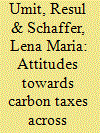|
|
|
Sort Order |
|
|
|
Items / Page
|
|
|
|
|
|
|
| Srl | Item |
| 1 |
ID:
176744


|
|
|
|
|
| Summary/Abstract |
While using carbon taxes to reduce greenhouse gas emissions may well be effective, this has recently proved too unpopular to put into practice in a number of countries. Yet, at a time when governments across the world are preparing their nationally determined contributions to the Paris Agreement, our knowledge of whether and why people oppose these taxes originates from a single or small number of cases. Drawing on the European Social Survey (n = 44,387), this article provides evidence on public attitudes towards increasing taxes on fossil fuels to reduce climate change from 23 countries, most of which have never featured in the literature before. The results point to a widespread aversion to carbon taxes. On the one hand, this worsens with the perceived costs of taxes, such as the case among consumers who depend highly on energy. On the other, it improves with political trust and external political efficacy—factors that help ease the uncertainty around policy proposals. Our estimations suggest that the effect of changes in these factors alone would be large enough to reverse the public resistance to carbon taxes in some countries. These results are robust to a number of alternative specifications and various checks.
|
|
|
|
|
|
|
|
|
|
|
|
|
|
|
|
| 2 |
ID:
118530


|
|
|
|
|
| Publication |
2012.
|
| Summary/Abstract |
The dominant explanation of public attitudes vis-à-vis economic globalisation focuses on re-distributional implications, with an emphasis on factor endowments and government-sponsored safety nets (the compensation hypothesis). The empirical implication of these theoretical arguments is that in advanced economies, on which this article focuses, individuals endowed with less human and financial capital will be more likely to experience income losses. Hence they will oppose economic openness unless they are compensated by the government. It is argued here that including social capital in the analysis can fill two gaps in explanations relying on factor endowments and the compensation hypothesis. First, generalised trust - one key aspect of social capital - constitutes a personal endowment alongside human and financial capital. Second, structural social capital - another key aspect of social capital - can be regarded as a nongovernmental social safety net that can compensate for endowment-related disadvantages of individuals. Both aspects of social capital are expected to contribute, for distinct reasons, to more positive views on economic openness. The empirical testing relies on survey data for two countries: Switzerland and the United States. For both countries, the results indicate that generalised trust has a strong, positive effect on public opinion of economic globalisation, whereas structural social capital has no effect.
|
|
|
|
|
|
|
|
|
|
|
|
|
|
|
|
| 3 |
ID:
133013


|
|
|
|
|
| Publication |
2014.
|
| Summary/Abstract |
Many advanced industrialized countries have, in recent years, experienced a significant expansion of electricity production from renewables. Yet we know quite little about the dynamics of the underlying policychoices in this area. Using new data on adoptions and changes in feed-in tariff and green certificate schemes in 26 advanced industrialized countries over 20 years, we examine both domestic driving forces as well as international determinants. The findings suggest that three factors play a particularly important role in pushing countries towards market-based support systems: characteristics of the existing energy supply system, a federalist structure of the political system, and EU membership. Particularly noteworthy is the finding that higher shares of fossil and nuclear energy in the national energy supply as well as higher CO2intensity of the economy do not, as we had expected, stand in the way of policies for supporting renewables in electricity production. To the contrary, they increase the likelihood of a country adopting such policies. We also find, however, that higher economic growth and higher growth in solar and wind energy capacity tend to reduce the political appetite for reforms of existing schemes.
|
|
|
|
|
|
|
|
|
|
|
|
|
|
|
|
|
|
|
|
|